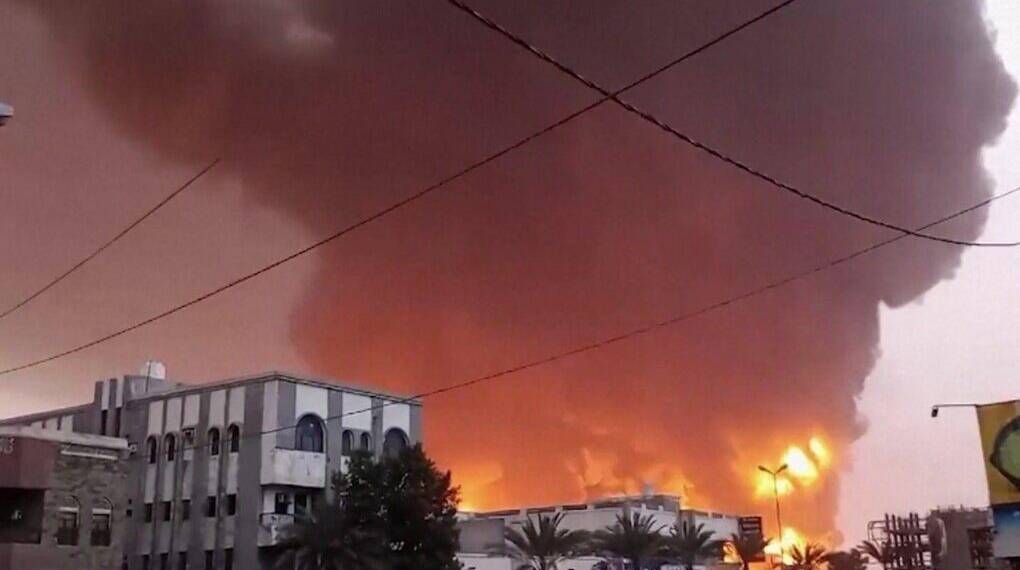In a dramatic escalation of the regional conflict, Israel has confirmed a new wave of airstrikes on Yemen’s Hodeida Port, a vital maritime hub, targeting what it called Houthi-operated launch sites used in attacks on Israeli territory. The strikes come amid deepening military operations in Gaza and growing international outcry over the humanitarian crisis in the besieged enclave.
Just hours after the strikes, the Israel Defense Forces (IDF) said it successfully intercepted a ballistic missile fired from Yemen, which triggered alarms across central Israel. Though no casualties were reported, the incident heightened tensions and prompted a stark warning from Defense Minister Israel Katz: “Yemen’s fate will be the same as Tehran’s.” The warning referenced Israel’s recent strikes on Iranian assets, suggesting a growing willingness by Israel to expand its military response across the region.
The Houthi group, aligned with Iran and entrenched in Yemen’s civil conflict, claimed responsibility for the missile attack, calling it retaliation for what they described as Israeli aggression.
New Front in Yemen?
Prime Minister Benjamin Netanyahu has long hinted at broader regional action, but the latest developments mark a possible opening of a new front in Israel’s complex web of hostilities. Analysts are now openly speculating whether Israel’s military will intensify its campaign in Yemen in parallel with its ongoing war in Gaza.
Meanwhile, the humanitarian situation in Gaza continues to deteriorate. For the first time in the 21-month war, Israeli ground forces have pushed into Deir al-Balah — a central city that had, until now, been spared from major assaults. Witnesses described heavy bombardments late Tuesday, with local medics reporting three civilians killed and dozens injured as tanks shelled residential areas and mosques.
The Gaza Health Ministry described the incursion as one of the deadliest yet, especially targeting areas where humanitarian aid was being distributed. The World Health Organization accused Israeli forces of attacking a staff residence and its main aid warehouse in the city.
Global Outrage Intensifies
Amid growing reports of starvation and civilian deaths, a chorus of international condemnation is building. The United Kingdom, France, Canada, Australia, New Zealand, and over 20 other countries issued a joint statement urging Israel to immediately end the war in Gaza.
“The suffering of civilians in Gaza has reached new depths,” said British Foreign Secretary David Lammy. The countries criticized Israel’s restrictive aid policy, saying that the “drip feeding of aid” to desperate civilians had become “horrifying.”
The statement marked a dramatic turn from key allies. Notably, four of the Five Eyes intelligence-sharing nations — excluding the United States — signed the statement, increasing diplomatic pressure on Israel from some of its closest partners.
Israeli officials pushed back. The Foreign Ministry blasted the statement as “disconnected from reality,” arguing it failed to place blame on Hamas and undermined efforts to pressure the militant group to release the estimated 50 hostages still held in Gaza.
The Human Toll
Over 59,000 Palestinians have been killed in Gaza since the conflict began, according to Gaza’s health authorities. The toll includes thousands of women and children and has raised allegations of disproportionate use of force by Israel, which has repeatedly stated that its military operations are focused on eliminating Hamas.
Aid organizations, however, warn that Israel’s siege and military strategy are endangering the very civilians it claims to be liberating. The United Nations and World Food Programme have accused Israeli forces of firing on aid seekers, with one recent incident near Gaza Humanitarian Foundation (GHF) sites resulting in dozens of deaths.
The GHF — set up as a U.S.- and Israel-backed alternative to UN-led aid distribution — has struggled to meet the overwhelming needs of a starving population, while critics argue it has made the humanitarian system more fragile and politicized.
Ceasefire Talks Faltering
The latest military escalations appear to be jeopardizing fragile ceasefire negotiations. While Israel insists that territorial seizures in Gaza are aimed at pressuring Hamas to release hostages, human rights groups and hostage families alike have expressed alarm.
A major Israeli hostage advocacy group said it was “shocked and alarmed” by the Deir al-Balah offensive and demanded answers from the Israeli leadership.
Despite mounting casualties and international condemnation, Netanyahu’s government remains steadfast. Foreign Minister Gideon Saar reiterated that Hamas is to blame for the ongoing war and civilian suffering.
In Washington, U.S. Ambassador Mike Huckabee denounced the international statement as “disgusting,” defending Israel’s right to defend itself and accusing Hamas of sabotaging peace efforts by rejecting multiple ceasefire proposals.
A War Without Borders?
With airstrikes in Yemen, continued operations in Gaza, and veiled threats toward Tehran, Israel’s campaign is increasingly taking on a regional dimension. What began as a response to Hamas’s October 2023 cross-border attack has now transformed into a broader conflict engulfing the Middle East.
As questions mount about the limits of Israel’s military ambitions, the region braces for more violence — and the world watches anxiously, hoping that diplomacy can still avert a full-blown regional war.








